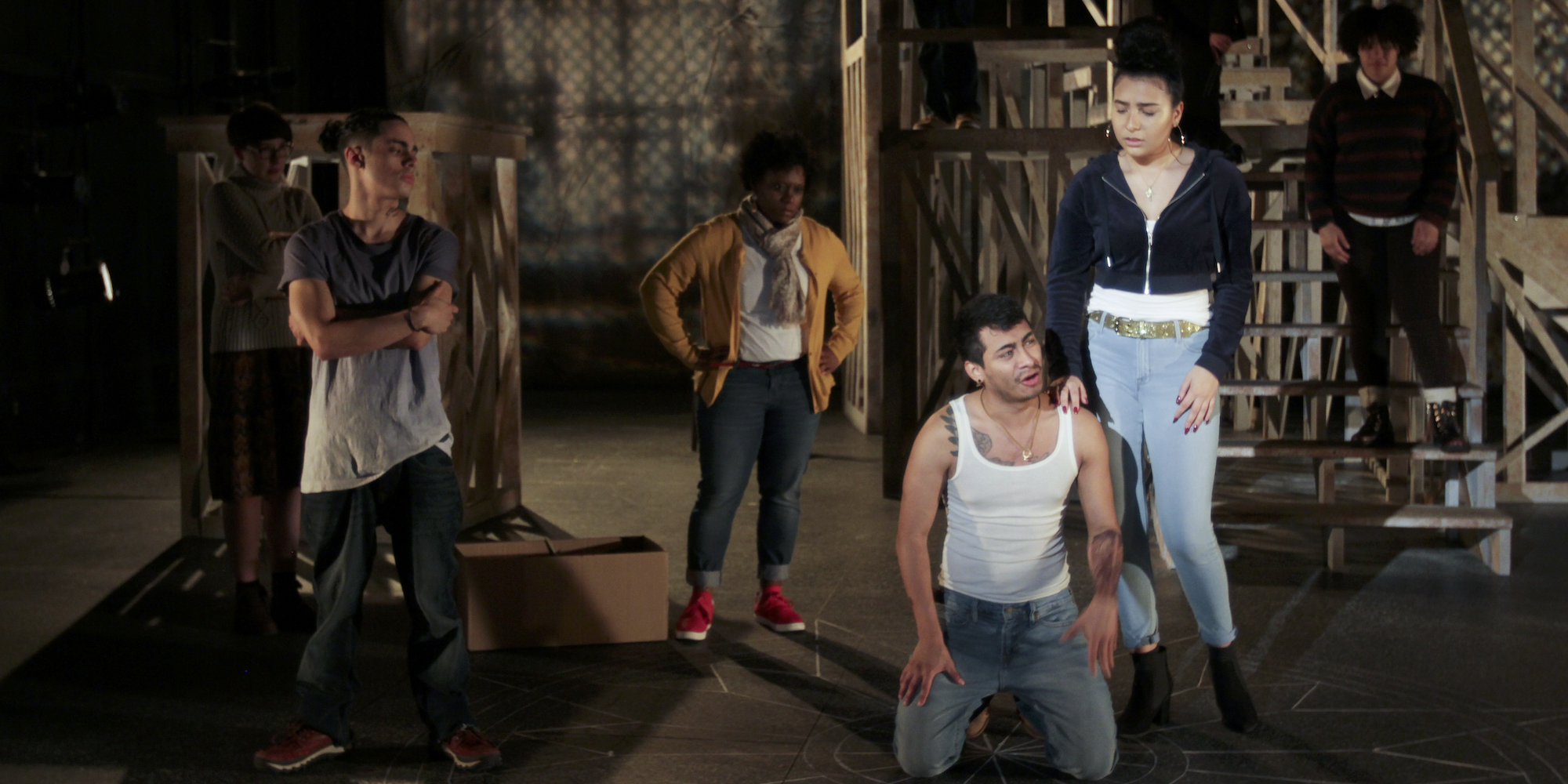
Krista Apple, Interim Program Director
kapple@uarts.edu
C O N T E N T S
Application
Learn more and apply to the Acting program.
Description
The four-year Bachelor of Fine Arts Acting program prepares the student for professional careers in theater, film/TV, or continued study at the graduate level. Most importantly the training offers breadth and depth in a variety of studies and practices, which enables the student to function successfully as an active and productive member of society at large.
The Acting curriculum revolves around 6 hours per week of Acting Studio, and is supported by Voice and Speech for Actors and Movement for Actors, each with 3 hours of instruction per week respectively. In addition, all Brind School students have core requirements: Survey of Theater Arts, Script Analysis and Theater History I & II. Acting majors are also required to participate in Brind School productions both through Production and Crew credits, as well as fulfill Lab Hours as actors in curricular support of DPP (Directing, Playwriting & Production) courses, School of Film courses, and/or capstone projects.
The Voice and Speech work has focuses in Linklater, IPA (International Phonetic Alphabet), Fitzmaurice Voicework, text work/Sonnets, and voice acting. In the sophomore year there are additional lab hours required, consisting of voice work and a regimented, physical group warm-up. The Movement work has focuses in neutral mask, Laban Efforts, Contact Improvisation, Viewpoints, and Stage Combat, a semester of which is required with various additional levels offered through electivity.
The 6 hours of Acting Studio start in the freshman year when the student is introduced to the basics of behavior and acting through improvisation and the techniques outlined by Uta Hagen in “Respect for Acting.” Improvisation is used as a technique to develop the students’ capacity to listen and respond, develop their imaginations and live in the moment. Uta Hagen’s technique develops the students’ capacity to “re-creating behavior which leads to the achievement of a simple objective” through sensory exploration and “object exercises”. In the spring the class embarks upon the Explorer Project which, leaning on the techniques developed in the fall, engages the work of contemporary playwrights whose worlds inspire expansive thinking around time, place, and context: playwrights including Charles Mee, Caryl Churchill , and Mary Zimmerman.
The sophomore year Acting Studio is Technique I & II and the student is immersed in learning and applying acting techniques. They are introduced to the psycho-physical approach to acting through the writings of Constantin Stanislavski and Michael Chekhov. The writings of Stanislavski and his System are the bedrock of the majority of contemporary psychological and text based acting techniques. The technique has the tools needed to analyze, break down and interpret text and character in a constructive and active way. This approach is synthesized with psycho-physical exercises of Michael Chekhov allowing for dynamic activation of the imagination, voice, and body to create circumstance and character. These techniques are applied to scene work from diverse American playwrights from the 20th and 21st century.
The junior year Acting Studio continues with the Stanislavski System in the fall semester with playwrights such as Williams, Chekhov and Ibsen in the Poetic Realism Acting Studio. The spring semester progresses to deepen the work on heightened text with Shakespeare in Verse Drama. Acting on Camera is taught throughout the junior year to train the actor in another medium within the profession. Also Directing I is required as a junior to reinforce and sharpen the students’ objectivity in approaching text and articulating a strong point of view. Audition Techniques is part of the spring schedule as we begin to prepare the students for professional realities.
The senior year continues to prepare the student for the profession with Business of Theater, and is a year that is largely elective. The student needs to complete electives within the major and can choose from a range of options, which may include additional on-camera training (Film and Acting Collaboration courses, Short Film Electives, etc.), Contemporary Scene Study, playwright/style based studios (Brecht, Beckett, O’Neill, Wilson, Comedy of Manners, etc.), the creation of devised work, physical theatre, Improvisation, Commedia and so on. There are also opportunities for Independent Studies, Internships and semester exchanges both regionally and abroad.
Program Objectives
In addition to the Learning Outcomes of the School of Theater Arts, Ira Brind, Acting graduates will be able to:
- Take creative risks, engaging their unique imaginative impulses and contributing strong generative proposals in both devised and scripted work with trust in themselves and the ensemble.
- Fully integrate an active imagination with an active and dynamically aligned body, and a strong, supported voice, all capable of meeting the demands of text, character and given circumstances.
- Effectively analyze scene and play structure, identify dramatic conflict, and shape specific choices of objective, obstacle and tactic that serve both the needs of the script and the artist’s imaginative impulse
Program Requirements (120 credits)